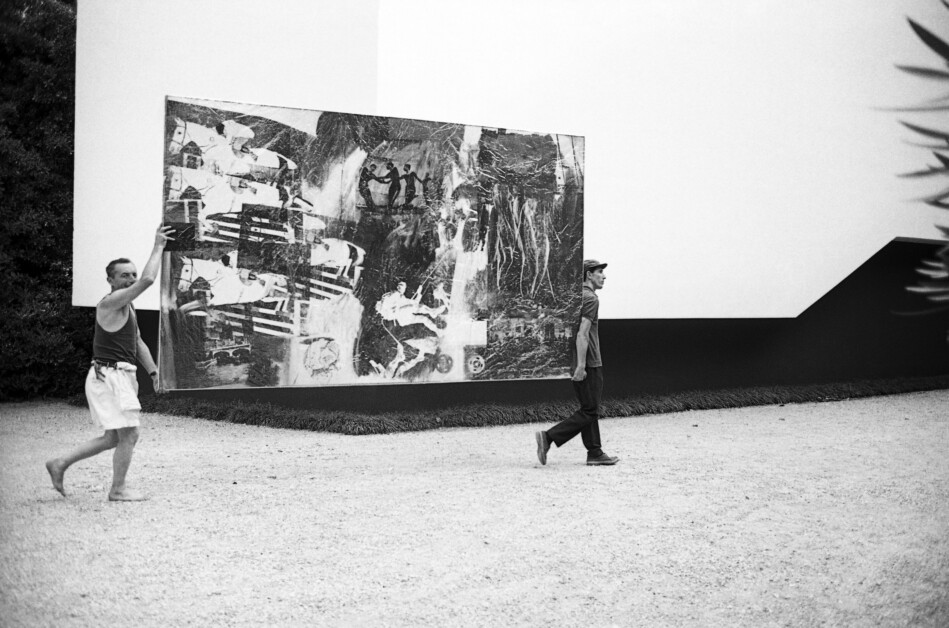In the high-stakes geopolitical game, there is an arsenal of both soft and hard power. The latter often refers to a country’s military might, while the former is diplomatic. However, there is more to soft power than simple negotiations or peace talks. Soft power is often more subliminal. In The Cold War, ideology played a significant role in the conflict between the United States and the Soviet Union. In the 1960s, the US government engaged in a covert operation to win the Venice Biennale. Referred to as the Olympics of Arts, the US sought to rig this effort with an American victory. In what has the makings of a spy thriller, the documentary Taking Venice shows how the US took the top art prize and scored an ideological win.
Director Amei Wallach is a child of the Cold War and remembers its impact on American politics and society. In a battle to stop the spread of Communism, the United States saw an opening in the 1960s to fight Communism, not with bullets, but with culture. Through archival footage and interviews, Wallach takes audiences back to the turbulent ’60s. At a time when the space race was in full throttle, John F. Kennedy was President, and a feeling of hope rang out across the country. In contrast, the film also shows the calculated measures of the US government, brought on by Cold War paranoia. Brilliantly, the film shows the intricate overlap between art and politics.

This mission was like a covert operation from a high-stakes thriller right out of the movies. Fictional in its conception but intricate in its planning. The US sought to infiltrate the Venice Biennale so that their chosen artist, Robert Rauschenberg, could win the prize. Looking to prove the country had more to show than cars and bubblegum, an American winning was seen as a cultural missile in the Cold War.
The mission, as it were, included a cast of characters right out of central casting. In addition to Rauschenberg, Alice Denney, an art connoisseur and friend of the Kennedys, helped secure the ambitious curator Alan Solomon to organize the US entry into the competition. Lastly, with a big-wig art dealer, Leo Castelli, at their side, the trio sought to ensure the chosen pick of Rauschenberg went home with the prize and glory.
Taking Venice, in addition to offering a portrait of America circa 1964, provides a compelling examination of the man who won the Olympics of Art that year. Rauschenberg, a new-age artist and part of the Avant-Garde of the ’60s, was catapulted into international fame with his win. His art, seen as a commentary on America’s strengths and weaknesses, resonated with the international art community. The film documents the later international outcry over his win, which shaped his perception of his country and left a lasting impact on the global art scene.
The film points out that, at the time, Rauschenberg did not consider himself a political artist. Ironically, his experience winning the Venice Biennale made him into something of an activist. Rauschenberg later hoped to show the world that art could be a transformative part of shaping history for the better.

Taking Venice works on a vast canvas that includes interviews, even from some original organizers. Alice Denney, who recalls her Kennedy connections, is an insightful contributor. The 35th President undoubtedly knew the importance of art as a cultural weapon that could shape history as effectively as any military strategy. The film masterfully exposes the inner workings of art and politics, revealing how artists, knowingly or unknowingly, become pawns in the game of power.
The film is wickedly brilliant. It is an engaging historical drama, but with deftness shows the intersection of art and politics. For it has been so eloquently said by the artist Igor Babailov, “Art is an international language understood by all.” Bravo!
Taking Venice is currently playing at the IFC Center in New York courtesy of Zeitgeist Films. The film will expand to the Laemmle Royal in Los Angeles on May 24th with additional markets in the following weeks.
The film is wickedly brilliant. It is an engaging historical drama, but with deftness shows the intersection of art and politics. For it has been so eloquently said by the artist Igor Babailov, "Art is an international language understood by all." Bravo!
-
GVN Rating 8
-
User Ratings (0 Votes)
0

Writing & podcasting, for the love of movies.
His Letterboxd Favorites: The Dark Knight, Halloween, Jaws & A Christmas Story.






